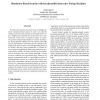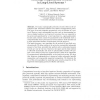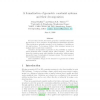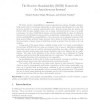202 search results - page 12 / 41 » Composing and decomposing systems under security properties |
CSFW
2006
IEEE
14 years 2 months ago
2006
IEEE
Recently, there has been much interest in extending models for simulation-based security in such a way that the runtime of protocols may depend on the length of their input. Findi...
CONCUR
2008
Springer
13 years 10 months ago
2008
Springer
Abstract. For many cryptographic protocols, security relies on the assumption that adversarial entities have limited computational power. This type of security degrades progressive...
FAC
2010
13 years 7 months ago
2010
For more than a decade, the trend in geometric constraint systems solving has been to use a geometric decomposition/recombination approach. These methods are generally grounded on...
CSFW
2012
IEEE
11 years 11 months ago
2012
IEEE
The onion routing network Tor is undoubtedly the most widely employed technology for anonymous web access. Although the underlying onion routing (OR) protocol appears satisfactory...
IANDC
2007
13 years 8 months ago
2007
We define reactive simulatability for general asynchronous systems. Roughly, simulatability means that a real system implements an ideal system (specification) in a way that pre...




